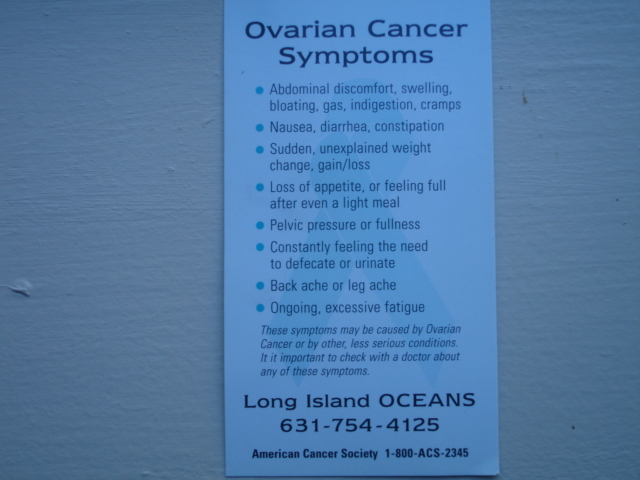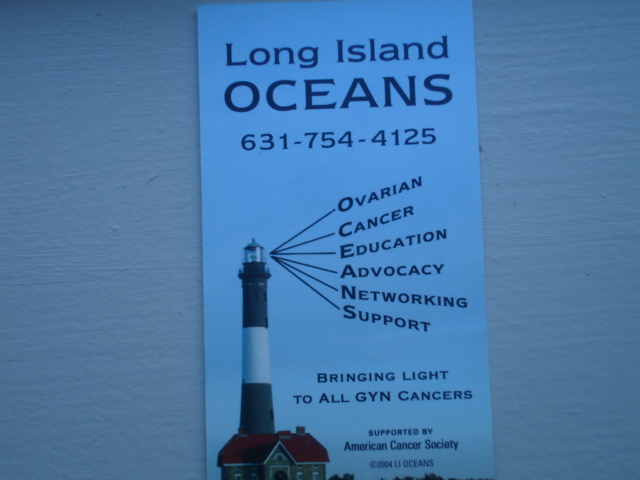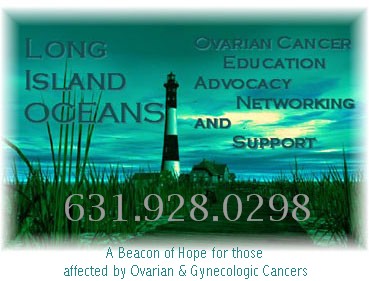Ovarian cancer is the leading cause of death from gynecologic cancers in the United States, and is the fifth leading cause of cancer death among U.S. women. According to the American Cancer Society, it is estimated that 22,430 women will be diagnosed with this cancer in the U.S. in 2007, and about 15,280 women will die from the disease.
A woman’s lifetime risk of ovarian cancer is 1 in 67; it is an insidious disease that often strikes without warning and without cause. The symptoms of ovarian cancer are often vague and subtle, making it difficult to diagnose.
Currently there is no effective means of early detection for the disease. As a result, ovarian cancer is usually diagnosed in advanced stages and only 50% of women survive longer than five years. Today, only 25% of cases are diagnosed in the early stages, i.e., before the cancer has spread beyond the ovary to the pelvic region. However, if ovarian cancer is detected and treated early, the five-year survival rate is greater than 90%.
Until we have an effective way to detect ovarian cancer, we urge all women to become educated about the disease so she can act independently to protect her health.
Signs & Symptoms of Ovarian Cancer------
Recurrent unexplained back pain
Women with ovarian cancer report that symptoms are persistent and represent a change from normal for their bodies. The frequency and/or number of such symptoms are key factors in the diagnosis of ovarian cancer. Several studies show that even early stage ovarian cancer can produce these symptoms.Women who have these symptoms almost daily for more than a few weeks should see their doctor, preferably a gynecologist. Prompt medical evaluation may lead to detection at the earliest possible stage of the disease. Early stage diagnosis is associated with an improved prognosis.
Several diagnostic tests exist that can be used to detect ovarian cancer. The three most common tools are:
Vaginal-rectal pelvic exam
Transvaginal ultrasound
CA-125 blood test
Because of the margin of error associated with each of the tests, they are most effective when used in combination with each other.
Other diagnostic tools include:
Transvaginal color flow doppler
CT (or CAT) Scan
Lower GI series or barium enema (occasionally)
All females are at risk, all ages.
Risk Factors
• Increasing age, with highest occurrence in women over 50
• Family or personal history of ovarian, breast, endometrial, or colon cancer(only 10% of cases are linked to family history, however)
• Uninterrupted ovulation (having no pregnancies; infertility, low parity)
• Presence of BRCA1 or BRCA 2 gene mutations
Prevention & Risk Reduction
• Use of oral contraceptives for more than five years can reduce your risk by approximately 50%
• Multiple pregnancies, having first full-term pregnancy before the age of 25
• Breast feeding• Hysterectomy/Tubal ligation substantially reduces risk
• Removal of the ovaries and fallopian tubes (oopherectomy) dramatically reduces, but does not completely eliminate, risk of developing ovarian cancer.
What do I do if I am concerned about my risk of ovarian cancer or have symptoms that persist and are unusual for me?
• Speak to your gynecologist for more information and have an examination. Be sure to discuss the possibility of ovarian cancer with your doctor.
How is Ovarian Cancer Diagnosed?
• The PAP test is used to detect cervical cancer, NOT ovarian cancer.
• A vaginal-rectal pelvic examination (also called a bimanual exam) – This exam allows the ovaries to be examined from many sides. Every woman should undergo a rectal and vaginal pelvic examination at her annual check up with her gynecologist.
• Transvaginal Ultrasound - This test uses sound waves to create a picture of the ovaries, and can often reveal if there are masses or irregularities on the surface of the ovaries. It cannot determine if you have cancer but it can show characteristics that give different levels of suspicion.
• CA125 blood test - This test measures the level of a substance in the blood that may increase when a cancerous tumor is present; this protein is produced by ovarian cancer cells and is elevated in more than 80% of women with advanced ovarian cancers and 50% of those with early-stage cancers. Because CA125 misses half of early cancers and can be elevated by benign conditions, the National Cancer Institute (NCI) does not endorse using it to screen women at ordinary risk or in the general population.
• It is very important to note that none of these tests are definitive when used on their own. They are most effective when used in combination with each other. The only way to confirm the presence of ovarian cancer suspected by the above tests is through a surgical biopsy of the tumor tissue.
If tests suggest the possibility of ovarian cancer, seek referral to a gynecologic oncologist:
• A gynecologic oncologist is a professional who specializes in treating women with reproductive tract cancers.
• Gynecologic oncologists are initially trained as obstetrician/gynecologists and then undergo three-four years of specialized education in all of the effective forms of treatment for gynecologic cancers (surgery, radiation, chemotherapy and experimental treatments) as well as the biology and pathology of gynecologic cancers.
Why is it so important to be treated by a gynecologic oncologist?
The importance of being treated by a gynecologic oncologist cannot be stressed enough. According to numerous medical studies, there are significant survival advantages for those women who are treated, managed, and operated on by a gynecologic oncologist.
• Gynecologic oncologists are 5 times more likely to completely remove ovariantumors during surgery• 80% of ovarian cancer patients receive inadequate surgical debulking and stagingfrom non-gynecologic oncologist surgeons• Survival rate and outcomes vastly improve with gynecologic oncologists
Today, most women are diagnosed when chance of survival for five years is about 25%. Early detection can improve the survival rate to over 90%!
The Only Cure for Ovarian Cancer is Early Detection.





























